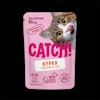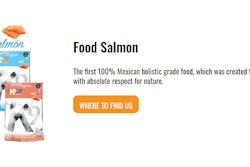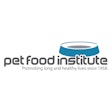
Wild-caught rainbow trout marketing claims conjure scenes of fish racing along the currents of a chilly brook and a tweed-hat-clad fisherman locked in Melvillian battle with Ol’ Greg, the wily trout that’s eluded him for nigh onto thirty years. While the ecological and social reality of the global fishing industry largely doesn’t fit pet owners’ nostalgic images, an archetypal good-hearted, foul-mouthed Captain Quint still helms the fishing vessel in many imaginations. A fish farm doesn’t have the same connotations.
Although not as glamourous, Monterey Bay Aquarium Seafood Watch lists some varieties of farm-raised fish among their best choices for ocean-friendly seafood. A well-managed fish farm can reduce pressure on wildlife, while minimizing pollution and ecosystem disruption, but the opposite holds true for poorly run aquaculture operations. Some animal advocacy and ecological sustainability groups contend that fish farming can harm the animals, damage wild fisheries and pollute surrounding ecosystems.
Lawsuit alleges false advertising of Acana dog food
One of those groups, Animal Equity, filed a lawsuit against Champion Petfoods alleging false advertising of several brands of Acana pet food made with rainbow trout. Animal Equity believes that the use of the term “wild-caught” to describe rainbow trout in Acana products is incorrect. The group noted the used of the marketing claims, “caught by fishermen we know and trust” and “from American waters.” Animal Equity stated that most rainbow trout available in the United States are farm raised. Likewise, the group alleged that Champion’s use of imagery, including fishermen poised by natural bodies of water, misleads consumers about the trout’s origin. Instead, Animal Equity claims Champion sources their rainbow trout from Idaho, where large-scale aquaculture farms produce much of that fish species.
The United States Code of Federal Regulations states that “wild fish and shellfish means naturally-born or hatchery-originated fish or shellfish released in the wild, and caught, taken, or harvested from non-controlled waters or beds; and fillets, steaks, nuggets, and any other flesh from a wild fish or shellfish.”
Ethoxyquin controversial in pet food
On behalf of Animal Equity, a third-party laboratory tested samples of Acana and allegedly found that the fish showed signs of a life in captivity, including the presence of ethoxyquin in the pet food. Ethoxyquin is an antioxidant used in fish feed to prevent rancidity. Within the pet food industry, ethoxyquin can cause marketing challenges. In the 1990s, the United States Center for Veterinary Medicine (CVM) began receiving complaints from dog owners claiming ethoxyquin in the dog food caused various health problems. However, the CVM found scarce scientific data to support these contentions, or to show other adverse effects in dogs at levels approved for use in dog foods. Nevertheless, many pet owners reject ethoxyquin in their pets’ food. What’s more some countries regulate its use, particularly the United States, and require it to be noted on package labels. The U.S. Food and Drug Administration set specific levels of ethoxyquin that pet food and other products can contain. FDA requires specific wording labeled on any product containing ethoxyquin, even if only present as a component of another ingredient. Pet food labels must be labeled with “Ethoxyquin, a preservative,” or “Ethoxyquin added to retard the oxidative destruction of carotene, xanthophylls, and vitamins A and E.”
In court documents, Animal Equity claims that pet owners perceive wild-caught fish to be healthier, tastier and higher quality than farm-raised seafood, and states that pet owners will pay a premium for wild-caught fish. Animal Equity seeks a court-ruling that use of the term “wild-caught” misleads consumers and blocking Champion Petfoods from using the marketing claim in the future for those products. The organization does not seek monetary damages.
Potential legal response to lawsuit by Champion
One lawyer with expertise in pet food labeling gave his opinion on Animal Equity's case against Champion Pet Foods, which was filed in the Superior Court of the District of Columbia.
“Understand I do not represent them, but generally you might expect to see an entity in Champion’s position first move to dismiss the case on a number of grounds, including failure to state a claim – and a focus on ‘no reasonable consumer’ could be mislead by what is being complained of,” Michael Annis, partner with Husch Blackwell, said. “You might also suspect they are looking into primary jurisdiction contentions – that FDA/USDA is either in the process of or should be in the process of defining the term for use in food advertising.”
A lack of regulatory definition can lead to problems for pet food companies when marketing terms create ambiguity. Many of these quality-related terms are associated with the methods used to produce a pet food or ingredient. Annis provided these examples of undefined pet food marketing claims:
- Artisanal
- Craft
- Handmade
- Small Batch
Pet food companies could face legal problems if their production methods don’t match consumers’ ideas of what artisanal or craft means. These terms can be what Annis called trigger terms. Trigger terms are specific words or phrases used in marketing that may leave the pet food company open to legal action in various ways. Some terms may be loosely defined and open to interpretation by consumers and courts. Others of these marketing terms may be unsubstantiated or make unfounded claims about benefits and qualities.
“The terms that are most dangerous to use as an advertiser are those that have no regulatory-defined meaning,” Annis said. “The ambiguity of a term, and how that term might be understood by a “reasonable consumer” and impact on purchasing decisions is what make these consumer class actions go from a plaintiff’s perspective.”
Champion Pet Foods did not respond to a request for an interview or comments.


















